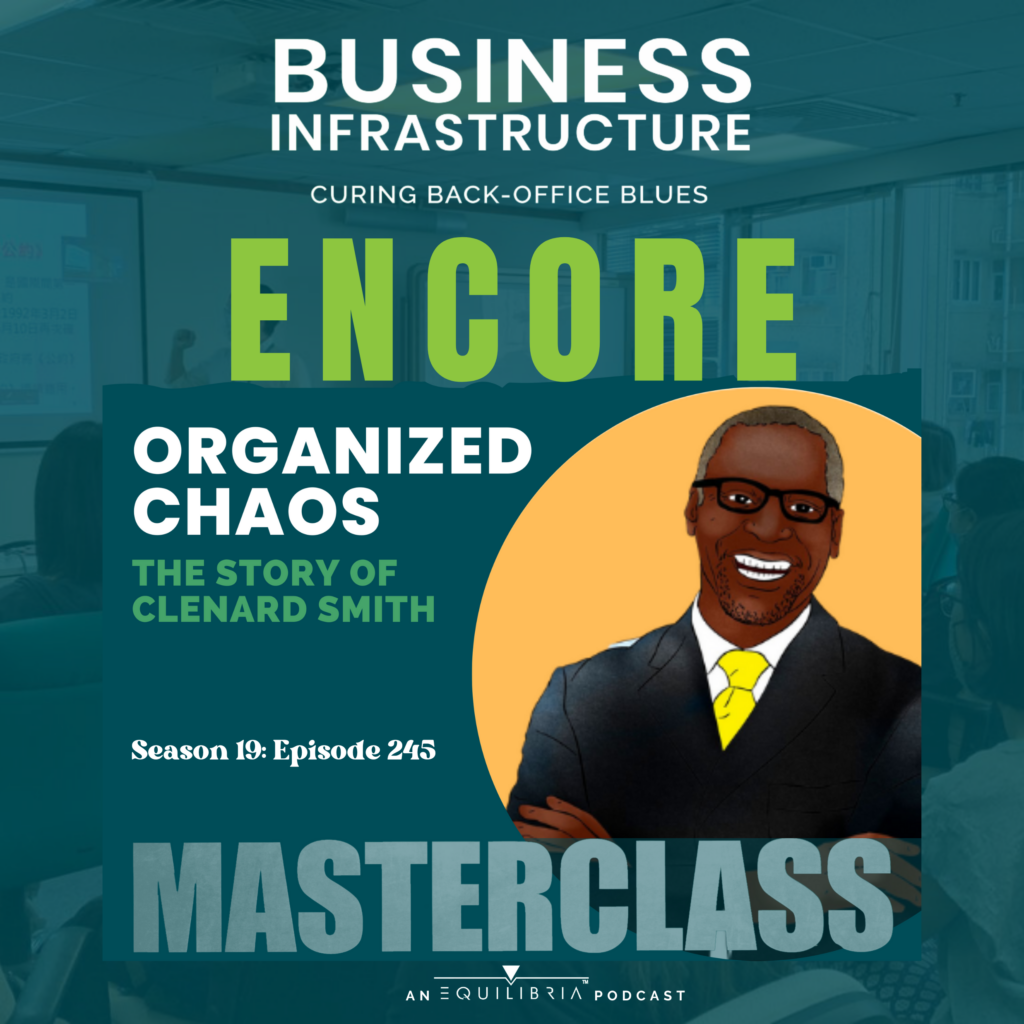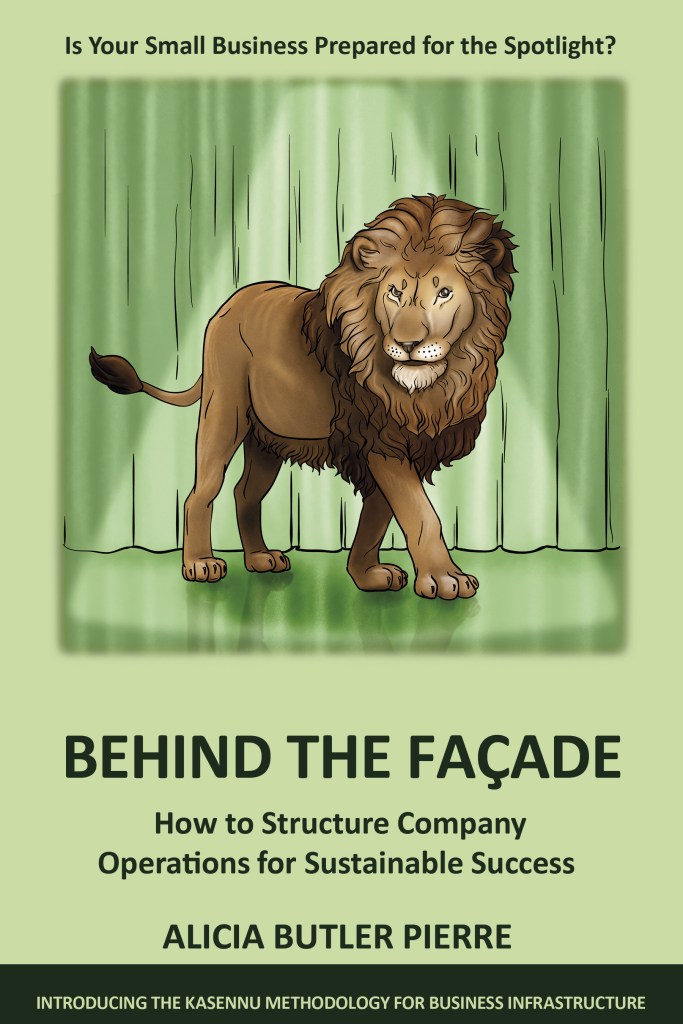Transcript
This episode originally aired on March 13, 2022.
For the past several episodes, you’ve heard the relatable stories of passionate entrepreneurs as they feverishly work to calm the chaos of fast growth. Each of those stories is followed by a do-it-yourself tutorial so that you can apply the concepts to your organization.
We’re now coming up on the final story of our audio masterclass on business infrastructure.
It features Clenard Smith – a tenacious veteran who prides himself on conquering whatever business and life challenges are thrown at him. But he’s blindsided when an unlikely enemy surfaces, threatening to undermine everything he’s worked so hard to build.
This is episode 245. Organized Chaos – The Story of Clenard Smith & the Flourishing Food Distribution Company.
___________________
Driving from Chicago, Delores Tran knew she chanced traffic being horrendous. That’s why she intentionally chose to cross the state line from Illinois to Indiana on a route that would spare her of construction zones.
She was on her way to Gary, Indiana, a city with a steadily declining population once touted as one of America’s steel capitals. Delores hoped she would arrive on time. She hated being late.
Her phone’s navigation app announced when she reached her final destination. She turned off a busy street and followed the well-marked signs for visitor parking. She parked her car at 10:00 am on the dot.
Before her was a two-story building that seemed to stretch an entire block. The second floor was noticeably smaller than the first floor. Grabbing her tablet, she walked briskly toward the building’s front doors and placed her finger on a nearby buzzer to announce herself.
[Delores]: “Hello. My name is Delores Tran. I have a ten o’clock appointment with Jackie Adams.”
Although Delores said she was there to see Jackie, she was actually there to conduct an initial consultation with Clenard Smith, the owner of this establishment.
Suddenly, she heard the door unlock as she pushed her way in. Once inside, she signed in at the receptionist’s desk and fastened her visitor’s badge to her jacket’s lapel.
No sooner than Delores sat down in the lobby, did Jackie Adams appear. From the distressed look on her face, Delores could tell Jackie had probably had a rough morning already.
[Jackie]: “Good morning! Hi Delores, how are you? Clenard wants to speak with you before I show you around.”
They took the stairs to the second floor, and immediately reached Clenard’s assistant’s office. It led to Clenard’s office and the door was open. There he was, Clenard Smith, all 6’2” of this 61-year-old military veteran whose reputation preceded him. At the sight of the two women, Clenard rose from the chair behind his desk, almost as if standing at attention to a commanding officer; the only thing missing was the hand salute. Before Jackie or Delores could utter a word, Clenard motioned for them to step inside his office.
[Clenard]: “You must be Delores.”
As he extended his hand to shake Delores’, he noticed she wasn’t wearing a watch.
[Clenard]: “You’re late.”
Jackie had warned Delores of Clenard’s sternness, but she was still stunned. She didn’t want this to be his first impression of her. She felt the need to defend herself.
[Delores]: Despite my best efforts, I walked into the building five minutes late. You know how that commute can be from Chicago to Gary.”
Clenard could tell Delores was about 5’2” tall and, based on her last name, probably had Vietnamese heritage. He learned over the years how intimidating his taller frame and darker skin could be so he softened his voice and offered a seat to Delores. He looked at Jackie.
[Clenard]: “Give us about 30 minutes to talk. Then you can come back and give her a tour.”
Jackie agreed and closed the door to his office on her way out. When Delores sat on the soft leather chair in front of Clenard’s desk, she realized that, in getting over her shock of their initial encounter, she completely overlooked the sheer beauty of his office. It reminded her of a museum. There were solid cherry wood bookcases with glass enclosures lining the two sidewalls of his office. On top of each bookcase was recessed lighting that illuminated figurines and framed quotes above the lighting.
Delores risked getting a crook in her neck, but she couldn’t help looking up and around, trying to take in all of the artifacts in Clenard’s office.
[Clenard]: “Intrigued by what you see?”
[Delores]: “I’m sorry, I couldn’t help but…”
[Clenard]: “No need to apologize.”
Realizing she was wasting valuable time, Delores returned her attention to Clenard who sat across the desk from her. As she turned in her chair to face him, she noticed the quote Veni, Vidi, Vici carved into the center of the front panel of his desk.
[Delores]: “I came, I saw, I conquered.”
[Clenard]: “Do you know 90% of the people who come into my office for the first time have no idea what this means? You’ve ruined my icebreaker!”
[Clenard]: “I hear you and Jackie met at a Chamber of Commerce meeting a few months ago.”
[Delores]: “Yes, that’s right. I was a panelist at a regulatory compliance event for small businesses. Jackie introduced herself to me. We’ve talked a few times on the phone since then. She told me that you have a big audit coming up a year from now.”
[Clenard]: “Um-hmm. So, Delores, tell me a little bit about yourself.”
[Delores]: “Sure. I’m originally from Vietnam. I came to America with my parents and both sets of grandparents when I was a little girl. By the time I was in high school, I knew I wanted a career in public health. It was my way of combating the ignorance so prevalent about my family and the Asian-American community at large. After college, I went on to work as a public health inspector for 35 years.”
[Delores]: “I retired almost two years ago but still wanted to be active in the public health space so I decided to start my own consulting firm helping small businesses in the food and beverage industry become compliant and audit-ready. When I joined the Chamber, I met other small business owners who told me about the Kasennu framework for business infrastructure. I saw this as a tool I could use to help my clients, especially when they started to grow quickly, and…”
There was a knock on the door.
[Delores]: “Is it 10:30 already?”
[Clenard]: “Yep, that’s what it looks like. You’d know if you wore a watch.”
Clenard smiled sarcastically at Delores.
Jackie opened the door to Clenard’s office. The time seemed to fly by and Clenard asked for a few more minutes to speak with Delores. He found her story to be fascinating. Jackie knew this was a good sign, but she reminded him about another meeting at 11:00 am.
[Clenard]: “Fine. You see this, Delores? I have all of these women telling me what to do!” Let me at least treat ya’ to lunch. Jackie, my next call should be over by noon. That should give you enough time to show Delores everything, right?”
Jackie nodded in agreement and escorted Delores out of Clenard’s office and formally introduced her to his assistant. A few minutes later, she gently knocked onto the doors of other offices to make more introductions.
[Jackie]: “As you can see, we don’t have cubicles around here. We have glass cages!”
Delores noticed that the wooden doors of the offices on the second floor each had a large, glass panel. They turned a corner and went down a few steps that led to a closed glass door with the words BREAK ROOM etched onto the glass. It was on the mezzanine level of the building and had a long, rectangular shape.
[Jackie]: “Welcome to The Watchtower!”
Jackie explained that the employees dubbed the break room The Watchtower because of the wall encased with a one-way mirror that overlooked the distribution and warehouse areas below on the first floor. Delores walked up to the wall and peered out onto the first floor. She couldn’t help but think of how the sight of the employees reminded her of Santa Claus’ elves busily working in the toy shop as depicted in many Christmas movies.
Delores continued looking out of the glass wall in amazement as Jackie talked.
[Jackie]: “Downstairs is where the magic happens. This room is like an observation deck. I remember when Clenard bought this building about six years ago. Originally, it had small windows, but Clenard worked with a contractor to have them, and the wall removed and replaced with this durable, one-way mirror made of bullet-proof glass instead.”
[Delores]: “Bulletproof glass?”
[Jackie]: “Yep, that’s right. Bulletproof. I guess you can say, ‘you can take the man out of the military but you can’t take the military out of the man.’ This is just one example of how extreme Clenard can get. It’s also why, I believe, our turnover is so high. Don’t get me wrong, he’s a good person, he really is. He has a heart of gold but sometimes he can be SO extreme! God bless Sandy. I don’t know how she put up with it all those years.”
[Delores]: “Who’s Sandy?”
[Jackie]: “Cassandra. His wife of 28 years. She passed away about two years ago. Cancer. It was hell on Clenard. To be honest, things haven’t been the same since. Come. Let me show you the real reason why we need your help.”
Jackie motioned for Delores to follow her out of The Watchtower and back onto the second floor. They walked toward a set of solid, wooden double doors. When Jackie unlocked the door, it creaked from not having been open in a long time or at least not regularly. There was also a slight stench, an odor indicative of a room that was not receiving proper ventilation. Jackie turned on the lights. The room was huge. It spanned across the entire width of the second floor.
Inside the room were what seemed to be endless stacks of boxes spread as far and as high as the eye could see. Some of them were labeled and others weren’t. There were also loose papers strewn about, as well as several filing cabinets, cleaning equipment and office supplies. Delores even saw a treadmill in there!
[Delores]: “Is this the supply room?”
[Jackie]: “No. This used to be Sandy’s office. No one really comes into this room since she passed away. I come in here occasionally; usually when we’re preparing for an audit or need certain historical files.”
Delores inquired about the contents of the boxes and filing cabinets. She felt a sense of sorrow as she continued looking around. This room was the polar opposite of Clenard’s office and ironically, was positioned on the opposite side of the building.
[Jackie]: “There’s a hodgepodge of stuff in here. A lot of it is Sandy’s medical records. Books and articles related to her treatments…basically anything that related to her illness is right here in this room. A few months after she died, Clenard paid some of the warehouse guys to go over to his house, box things up and bring them here. It was his way of coping. I’ve tried to broach the subject of cleaning out this room, but it’s tough even for me. Me and Sandy were tight. We were good friends.”
Jackie carefully walked through the aisles of boxed files. She turned back to look at Delores who stood near the room’s entrance still somewhat in disbelief. When she looked at her watch, she saw it was 11:55. She suggested they walk back to Clenard’s office.
Before they left the room, Delores asked for copies of the building’s blueprints. Jackie said she’d ask Clenard’s assistant to email a copy to Delores.
Clenard took Delores and Jackie to a buffet-style restaurant near the office. As much as Delores really wanted to get back on the road to Chicago, she knew she needed to take advantage of this opportunity to get as much information as possible from Clenard about the root causes of his company’s growing pains.
Once inside the restaurant, they wasted no time filling their plates at the buffet and securing a seat at a table. There was total silence until Clenard put his fork down onto his plate.
[Clenard]: “Damn, we all must be hungry as hell! None of us have said two words to each other since we sat down.”
Delores laughed so hard she thought her face would catch fire. She presumed now was as good a time as any to start asking questions.
[Delores]: “So, Clenard, why don’t you tell me more about yourself. What motivates you?”
[Clenard]: “I thought you’d never ask. In order to know what motivates me, you first need to know my background. You know from being in my office that I’m a military man, third-generation navy man, as a matter of fact.
[Clenard]: “When I was about 17 years old, I started working at one of the local steel mills. Gary was a very different place back then. It could rival any other growing industrial metropolis. The work was good and I saved as much money as I could.”
Clenard paused long enough to take a sip of water.
[Clenard]: “A few years later, I joined the Navy and was called to duty during the tail end of the Vietnam War. Eventually, I was stationed all over the Pacific. I lived in the Polynesian Islands, Hawaii, Guam, and the Philippines. Those were some of the best years of my life. I got to see the world!
[Clenard]: “I was honorably discharged after 12 years. I decided to move back home to Gary and pick up where I left off. But things had changed, it wasn’t the same Gary I knew as a kid. I made up my mind right then and there that I was going to do my part to resurrect the city. If it was great once, it could be great again, right? So I dipped into my savings and started a restaurant. By that time, I met and married my wife, Cassandra. The restaurant failed, badly!
[Clenard]: “Thank God I had a wife who believed in me. I was down but not out. So I regrouped and got smarter and more strategic about stuff. I realized that, while I had owned and operated one restaurant, the suppliers I worked with had several restaurants as customers throughout the Midwest. But I could only serve customers here in Gary.”
[Clenard]: “It was at that moment I decided I wanted to be a food distributor. But there was only one major problem. No bank would touch me. I was broke as a joke. My money was funny, my change was strange, and my credit just wasn’t gonna get it!”
Delores almost dropped the pen she was using to write in her notepad. Clenard is hilarious!
[Clenard]: “So my wife talked to her parents and I talked to mine. They each loaned us a few thousand dollars and I started the food distribution company you know now. It wasn’t much money, but it was better than nothing.
[Clenard]: “Of course, there were bumps and bruises along the way. But eventually, the orders started coming in faster than we could deliver them. But with the success came more prying eyes. Once we surpassed $10 million in revenue, we seemed to get onto the radar of every auditing agency you could think of. We’re preparing for the latest one, which is why you’re here. We’re running out of space and we’ve already caught heat because of it.”
[Delores]: “Clenard, thank you for giving me that background information. But you still haven’t told me what motivates you.”
[Clenard]: “I guess I ran my mouth so much that I forgot your original question. Alright…what motivates me? Well, part of what motivates me is the work that you do – infrastructure. Just like I use road infrastructure to distribute food so people don’t go hungry, you use business infrastructure to distribute systems and processes that keep businesses in business. Look, I have five grandchildren now. I want to leave a legacy for them. At the end of the day, wanting to leave a better world for them is what motivates me.”
It was almost 2:00 pm. Delores knew her commute back home to Chicago would be hellish. However, if she asked for a tour of the first floor of the building, she could save herself from having to make another trip. As they walked out of the restaurant, she asked for a tour of the first floor.
****
Clenard knew Delores was concerned about her afternoon commute and assured her that the tour of the first floor would take less than a half-hour. Before entering the area, he gave her a pair of thin, cloth booties, gloves, and a hairnet. Then, he pushed through a swing door that led to the hustle and bustle of the first floor. Although Delores laid eyes on this scene earlier from The Watchtower, actually being on the floor was a surreal experience.
She walked alongside Clenard on the outer perimeter of the first floor. It was one gigantic open space with large overhead signs to designate the receiving, storage, packaging, and loading areas. A heavy-set man soon walked toward them. It was Alvin Johnson, the general manager who oversees the floor operations.
Clenard resumed his tour with Alvin joining them. Eventually, they reached a set of offices that also had glass doors. One of the offices belonged to Alvin and the other two belonged to the shift supervisors. Alvin asked Delores if she had any questions so far.
[Delores]: “Actually, I do. I’m assuming that you all must have meetings. Where do you conduct them?”
Alvin looked over at Clenard. This was definitely a point of contention. He confessed that they meet upstairs in The Watchtower.”
Delores knew this wasn’t an ideal location. The Watchtower was clearly a break room intended for people to eat and, well, take breaks. It was not a place to conduct meetings, yet alone training. This explained why she saw two copiers and a steel bookcase with manuals on it when she was up there earlier with Jackie.
[Clenard]: “We just don’t have the space.”
Delores knew that wasn’t true. She asked Alvin about the frequency of their meetings as well as training. He told her they have daily production meetings at the beginning of each shift that usually takes place on the floor. But their weekly and monthly staff meetings are held in The Watchtower. Space becomes an issue when the folks on the second floor also need to have meetings. There are times when they can’t fit everybody into their respective offices. They’re competing for real estate and it’s getting worse by the day.
The three of them continued walking around the perimeter of the first floor until they made a complete revolution. Clenard escorted Delores back into the reception area of the building.
[Clenard]: “Delores, I know you’ve seen and heard a lot today. I hope we didn’t overwhelm you. Let me know if you have any more questions.”
[Delores]: “Thank you Clenard. I appreciate your hospitality. You’ve built an impressive business. As a next step, I’m going to review my notes as well as the blueprints. From there, I’ll prepare a proposal that will include a timeline for our work together. Thank you so much for your time today.”
****
By the time Delores returned to her home office, she realized she missed a call from Jackie. She listened to the voicemail message Jackie left.
[Jackie]: “Hi Delores, this is Jackie Adams. I just wanted to thank you for stopping by today and giving us an initial consultation. I can tell Clenard likes you. He doesn’t usually warm up to people so quickly. I’m sure you noticed that he didn’t mention much about his personal life during lunch. More will be revealed as we work together. Have a great evening!”
Two weeks later, Delores emailed a proposal to Clenard. He carefully read the first paragraph…
The actual layout of a workspace directly affects productivity, job satisfaction, and profitability. If a picture is worth a thousand words, then your workspace’s aesthetics and functionality are worth a million. Having the “right” setup for a productive work environment is vital to 1) communicating your company’s competency, 2) ensuring you continue attracting the right customers, vendors, and employees, and 3) creating an environment conducive for an initial public offering.
The proposal went on to list some of the benefits of re-organizing the second floor with passing the audit scheduled for August 2015 being the long-term goal. He continued reading…
The more immediate goal; however, is to secure additional space. This aligns with the Work Space Logistics element of the Kasennu framework for business infrastructure. Before we can start this work, we will need to implement other elements of the framework first. This work can begin in August 2014.
After reading the proposal in its entirety, Clenard asked his assistant to schedule a meeting with Delores to discuss it in person.
****
Delores arrived via train on her next trip to Gary. This time, she buzzed into the building 15 minutes early and waited in the lobby until Jackie came to meet her. As they walked toward Clenard’s office, Delores thanked Jackie for the previous text message she sent her.
[Jackie]: “Oh, no problem. Clenard knows we need to do this work with you. He has some questions. I’m sure he’ll try to challenge you. That’s just his way of doing things.”
When they walked into his office, Clenard was genuinely happy to see Delores.
[Clenard]: “Well, look who decided to come back! I guess we didn’t scare you off after all!”
[Delores]: “No, not at all. You didn’t scare me. I can handle you! I do have one request though. Can we meet in an office with a whiteboard that I can write on?”
[Clenard]: “Sure! We can talk in The Watchtower.”
Delores hesitated but realized this could be a good thing. When they arrived at The Watchtower, there were already several people in there. Clenard’s assistant was standing at one of the two copiers, someone was sitting at one of the smaller roundtables eating a snack, and Alvin, the general manager, appeared to be reviewing some paperwork with about five of the warehouse employees.
Um-hmm, just as I suspected, Delores thought. This Watchtower is detrimental to productivity. Seeing all the hustle and bustle, Jackie offered her office as a place to meet.
Once they settled in Jackie’s office, Clenard wasted no time in bringing up the proposal.
[Clenard]: “Conceptually, I don’t have a problem with your proposal, but I’m concerned about the timeline as well as one of the elements of the methodology.”
[Delores]: “Okay, which concern would you like for me to address first?”
[Clenard]: “The Service Delivery Blueprint. We don’t need that element of the framework. We already have that in place. Unless our first-floor operation didn’t impress you.”
[Delores]: “Oh, it’s certainly not that! The first-floor operation does seem to work like a well-oiled machine. It’s very clear to me that you’ve put a lot of time and effort into getting the core operations just right. But that’s just it, you’ve concentrated all the effort here and, for lack of a better word, diluted the second floor where the administrative operations take place. The Watchtower, for example, is causing more harm than good. It functions as a catch-all space.”
Clenard looked straight into Delores’ eyes as if to intimidate her, but she didn’t flinch.
[Delores]: “Each day you use that room for eating, administrative purposes, training, etc., is a day that you’re one step closer to getting those worker’s compensation claims you had before on the first floor. That room should serve one purpose and one purpose only — as a true break room or lounge room! It’s simply not big enough to accommodate the multi-purpose functionality it currently has. That may have worked when you first moved into this location, but the business is growing and, if you continue diversifying your customer portfolio, you’ll get even more business which means more employees, which means they will need adequate space.”
[Delores]: “I want you to think about this…if your company went public next month, would you have the space and logistics on the second floor to handle it? It’s like needing a bigger pair of shoes. What happens when your feet outgrow your favorite shoes? Do you still hold onto those shoes and try to force your feet into them? No! Why? Because you know you’ll cause more harm to yourself than good by trying to walk in a pair of shoes that are too small for you. It’s not worth stunting your growth, so you get a bigger pair.”
[Clenard]: “Delores, I’m fully aware that we need more space. I’ve been saying this for a while now.”
[Delores]: “Yes, but your solution is to relocate altogether. You already have the space here. There’s a large room at the end of the hall that could easily serve as a new conference room and possibly more. I know this is difficult to hear, but its time Mrs. Smith’s old office is cleared out. It’s valuable space that’s under-utilized.”
Jackie looked over at Clenard. His face was completely stoic. He showed no outward sign of emotion. He eventually broke his silence asking her to confirm the length of the overall project, not acknowledging the sensitive topic Delores brought up.
[Delores]: “I want to show you something. I’d like to sketch what I mean about the workflow being chaotic up here on the second floor.”
Delores stood up and walked over to the whiteboard in Jackie’s office. As she grabbed a dry erase marker, Clenard also stood up. He now had wrinkles in his starched pants and buttoned-up shirt. His 6’2” frame towered over Delores.
[Clenard]: “I’ve seen enough. You’ve said enough. No need to sketch anything. You’ve answered the main questions I had. Good seeing you again.”
Clenard abruptly walked out of Jackie’s office. Jackie closed the door behind him.
[Jackie]: “You’ve struck a nerve! But don’t worry, he’s going to sign your proposal. He just needs time to clear his head. Brace yourself, though. When we start cleaning out Sandy’s office, you might see more of that behavior!”
[Delores]: “Oh my goodness, Jackie! I hope I didn’t offend him. I, I should go talk to him.”
[Jackie]: “No, you don’t want to do that! He’s fuming and needs time to calm down. He’s not mad at you, he’s mad at himself. You know his mantra – Veni Vidi Vici. Well, dealing with Sandy’s death is one thing he hasn’t conquered. I’ve tried telling him we don’t need to relocate now. It’s money we can save. Come, I’d better take you back to the lobby.”
Delores was still speechless. Yes, Jackie assured her that everything was okay, but she felt a need to apologize to Clenard. On her way home, she sent him a text message…
[Delores]: “Please accept my sincerest apologies if I offended you. It was not my intention.”
****
Later that afternoon, one of Clenard’s grandsons and granddaughter arrived at his house. He told them to sit on the sofa in the living room. He went upstairs and returned with a photo album in his hand.
[Clenard]: “Would ya’ll like to see some pictures of when me and Grandma got married?”
His grandchildren gleefully said yes!
___________________
Hi, it’s me Alicia Butler Pierre. As you’ve probably guessed, Clenard has a lot going on. His project involves all the elements of the Kasennu framework you’ve heard on this audio masterclass. Unfortunately, there isn’t enough time to include every detail of the work he and Delores do together, but you can get that information in my book, Behind the Façade: How to Structure Company Operations for Sustainable Success. I wrote this specifically for you – the owner or manager of a fast-growing small business. Discover how you can maximize your efficiency and productivity with a workspace layout based on your business infrastructure. Get your copy today on Amazon or wherever books are sold online. Click the link in this episode’s description to buy your copy today!
___________________
To her surprise, Delores received a signed copy of the proposal the next day. The sessions for the Business Parts Analysis and Business Design Blueprint started in mid-August 2014.
Their work together went relatively smoothly and Clenard’s mood had lightened noticeably over these sessions. Though he never apologized to Delores for being curt during the proposal interview, she accepted Jackie’s former advice to not take it personally.
****
By the beginning of October 2014, Clenard’s company had redefined departments along with all the associated roles and their management structure. They were now ready to start the Service Delivery Blueprint sessions. Delores presented information to kick things off.
[Delores]: “We need to start figuring out what people do on the second floor, starting with activities that happen pre-distribution all the way to post-distribution.”
They walked into each person’s office on the second floor, asking questions based on imagining themselves first as a customer and then as a customer order. Three hours later, they all walked away with a greater appreciation for why people seemed to run around like chickens with their heads cut off on the second floor. It was clear that they all knew what they needed to do and when, but the spatial arrangement of their workspaces simply robbed them of productivity, efficiency, and effectiveness.
Just one week shy of Thanksgiving, Delores presented the Service Delivery Blueprint. It combined the supportive and administrative work performed on the second floor with the distribution preparation work performed on the first floor. For the first time, Clenard and his management team had a complete and holistic view of their company’s operations. Delores helped him realize how he had, in fact, treated the employees on each floor in isolation of each other, despite the interconnectedness of their work.
However, this was only one part of figuring out the optimal workspace layout. The other part involved clearing out Sandy’s old office.
Clenard and his team previously agreed that they would take the month of December off. There was no point in trying to work around all of the different holidays.
****
As Delores reigned in 2015, she had mixed emotions as she prepared for her first session of the new year with Clenard and his team. A month had passed since they last worked together. Although she loved the transformative nature of decluttering and organizing, she knew it would be emotionally challenging for Clenard.
The good news was that all Clenard’s sons offered to help in whatever way they could. Delores reviewed a document Jackie gave her. It contained recordkeeping guidelines dictated by the agency that would conduct their audit later that year in August. They would use this as a compass for determining which paper and electronic records to retain and archive versus which ones to purge.
The combined Paper and Electronic Records Management sessions began on a bitterly cold day during the second week of January 2015.
The records inventory work began in all of the currently occupied offices in two-to-four-hour increments. Delores was mindful not to cause too much of a distraction as she helped survey the paper and digital records of each employee. She also recorded the work performed in each office, in addition to measuring all furniture and equipment and documenting their respective uses.
****
The last four Paper and Electronic Records Management sessions took place on Saturdays and were reserved for decluttering Cassandra’s office.
During one of those sessions, Clenard became enraged. He was searching through papers in one of the boxes in Cassandra’s office and found something that upset him. After yelling a few expletives, he punched a wall so hard he cracked it. His oldest son asked that everyone clear the room.
A half-hour passed before Clenard’s son opened the door to the office and asked that everyone else rejoin them. When they walked in, Clenard apologized to everyone.
[Clenard]: “Sorry about that everybody. I saw something I didn’t like. Something that brought back real bad memories. But one monkey don’t stop no show! Let’s get back to work.”
Jackie and Delores looked at each other and then at Clenard. He nodded his head. It was his way of acknowledging that he was still committed to the process of decluttering his wife’s office.
Forty-five days later, all paperwork and digital files were organized, color-coded, and cataloged. The biggest change was Cassandra’s office. It was now completely empty. One day, Clenard and Delores stood in the middle of the vacant room.
[Delores]: “This room actually looks larger than what the dimensions show on the blueprints. There’s so much we can do with this space. How do you feel?”
[Clenard]: “Like a man who just got his get-out-of-jail-free card!”
****
Nearly seven months after Delores met Clenard, it was time to commence the highly anticipated Work Space Logistics sessions. It was mid-February of 2015 and a bad snowstorm threatened to delay the first of these sessions. However, Clenard insisted his team forge ahead.
Delores reminded Clenard and his team that she already took an inventory of and measured all furniture, fixtures and equipment in each office during the records management sessions. She would next conduct time and motion studies to understand everyone’s movement throughout the building.
She spent time verifying the measurements of each office in comparison to the blueprints. She also drafted her own sketches of each office onto graphing paper. Her stint as a public health inspector made her handy at reading blueprints and doing light drafting. Each office sketch, drawn to scale, also contained information on the furniture, fixtures, equipment, doorways, windows, electrical outlets, air vents, and direction and timing of sunlight exposure.
Delores used the business infrastructure software on her tablet to record the purpose of each office; in particular, who uses it, why it’s used, and how work is performed in it. Her notes also included candid feedback from these employees, along with their recommendations for what they thought would make their work environment more functional.
After several iterations of conceptually re-arranging the offices on the second-floor drawings, an ideal flow pattern emerged, one that allowed for information to flow in a straighter pattern, as opposed to the current, more turbulent flow.
Next, she set out to rearrange the layout of each individual office. Each layout needed to promote the overall second floor’s re-configuration. Delores then consulted with an architect. Soon, the solution for the best layout of Cassandra’s office became apparent. She just hoped Clenard would like and approve it.
****
This onsite meeting would be unlike any of the previous ones. It would take place in Sandy’s old office. They sat on fold-out chairs behind a folding table in the center of the empty room. She presented copies of her drawings.
[Delores]: “This is what it could look like; imagine the possibilities…I want to direct your attention first to The Watchtower room.”
She revealed the drawing of the new break room. Clenard, Jackie, and Alvin were stunned.
[Delores]: “The Watchtower is officially retired. It will actually be used for its original purpose, a break room. Not a spying facility slash copy room slash training room slash whatever. Notice that the one-way mirror will be replaced with a two-way mirror. People can look out from the second floor and people can look in from the first floor.”
Delores moved on to the next drawing. It showed Cassandra’s office.
[Delores]: “Wouldn’t it be great to have a dedicated, private space to conduct staff meetings, trainings and, not to mention, host auditors? This room is large enough to serve not only as a new conference room, but you can also install a room divider or build an actual wall to add two new offices. These new offices can accommodate some of the additional people you identified during the Business Parts Analysis exercise. This new conference room and office space will significantly reduce foot traffic through the break room and second floor.”
Clenard expressed concern about the conference room being wasted space. But Delores refuted that claim. Her research showed that there was at least one meeting taking place every hour somewhere in the building so the new conference room would rarely be unused. However, people would not be able to occupy the room on a whim. They would now have to either reserve the room via their email system or through his assistant.
Jackie and Alvin continued to marvel over the proposed layout of Cassandra’s old office, Delores reminded them they had more drawings to review. She began to show the remaining future state drawings of each office, one by one.
Delores ended the session by presenting an office relocation schedule as well as a recommendation for a contractor. She also suggested that Jackie work with Clenard’s assistant to order new furniture for the conference room and offices.
[Jackie]: “I have an even better idea. I’m going to reach out to an interior designer I also met at the Chamber. If we’re going to do this, I say we do it right. Just as we hired you as our business infrastructure expert, we need to hire an expert to help us in furnishing and sprucing up this room. Is that okay with you, boss?”
[Clenard]: “Yep, boss! Sounds like a plan!”
****
It was now the first week of March 2015. The time arrived to start converting Sandy’s old office into the new conference room and two offices. Delores spent the beginning of that week working closely with Jackie to confirm all the logistics for that Saturday. There would be a lot of moving parts on that day. It was important to make sure that their respective relocation plans were synchronized.
The plan was as follows: they agreed to relocate any required equipment first. This included the copiers in the newly restored break room. Jackie arranged for electricians and network specialists to assist first thing Saturday morning. This was a precautionary measure to minimize network downtime. Simultaneously, the contractor and his crew would erect a new wall to divide Cassandra’s old office and paint it.
Next, they would focus on relocating or rearranging any furniture and fixtures identified according to the approved second-floor drawings. As he did during the Paper and Electronic Records Management Saturday sessions, Clenard would pay a few warehouse workers double-time to move the furniture as needed. The day would end with a professional cleaning crew coming over to polish all furniture as well as buff the floors on the entire second floor.
All work flowed just as Delores and Jackie planned. Everyone arrived at their designated times ready to work. The cleaning crew worked last and finished buffing the floors.
As Jackie predicted, Clenard drove to the building, unannounced, the following Sunday afternoon. As soon as he badged into the building, he could smell the combined aroma of the lemon oil used in the cleaning supplies as well as fresh paint. He was almost afraid to walk onto the second floor for fear of leaving evidence of his presence. Instead, he just glanced down the hallway from his office and, later, left the building.
****
The following Monday marked the beginning of the seventh and final workweek of the Work Space Logistics sessions. Unlike the previous elements of the Kasennu framework, there was no need for Delores to present a full report. Instead, she summarized their completed work in a one-page document along with a few additional recommendations to get them prepared for the big audit later that summer. Clenard was noticeably absent – they asked that he not show up until later that afternoon. They wanted to do an official unveiling.
Later that day, the furniture company delivered bookcases to line the two sidewalls of the new conference room. As the contractors worked to bring the cubical walls and furniture for the new office, Delores, Jackie and Alvin removed the manuals and books previously boxed from the break room and from other areas throughout the building and placed them onto the bookshelves along with various company awards and plaques.
By 2:30 pm, all new furniture, fixtures, and equipment were in place.
[Jackie]: “Whew! This was long overdue. I never thought I’d see the day! Now we just need to wait for Clenard and his family.”
The moment for the big reveal arrived. Jackie overheard Clenard and his family walking down the hallway. Only Delores, Jackie, and Alvin were in the newly furnished conference room. Clenard’s granddaughter knocked on the door.
Jackie opened the door slowly. As Clenard’s family filed into the room one by one, all Delores heard were a bunch of oohs and aahs. She was tickled at the sight of his grandchildren’s uncontained excitement. Clenard walked in last. It was a while before he said anything. He walked around slowly, inspecting every square inch of the conference room and later the office with cubicles.
Delores asked that everyone take a seat at the new conference room table. She connected her laptop to the monitor mounted on the wall. She then projected the one-page summary and recommendations onto the monitor and looked at Clenard.
[Delores]: “With your new state-of-the-art corporate boardroom, you’re in an even better position to showcase your company’s IPO readiness. You should pass the audit in August with flying colors. However, there are a few more things I recommend to ensure the sustainability of all the work we’ve completed.”
[Delores]: “First, continue working, as finances dictate, with the interior designer to imbue the upgraded look of this room across the entire building.
[Delores]: “Second, take advantage of some of the site visits to larger corporations offered through the Chamber of Commerce. This will help you with ideas for extending the newfound corporate presence throughout the building.
[Delores]: “Third, begin documenting the processes associated with operations here on the second floor. This is a logical next step. There will be a workshop in mid-April in Atlanta focused exclusively on the Business Process Manual element of the Kasennu framework. It will be the last element you need to put into place to solidify your company’s business infrastructure. While a good bit of the other work we’ve done will help you pass the audit, the business processes will be like your catalyst for going public.”
Clenard stood and walked to the front of the room.
[Clenard]: “It feels good to have all of you here. It’s been a long time since my sons and my daughters-in-law were last here. Jackie, thank you for having my back all these years, through thick and thin. Alvin, thanks for being my wingman. And Delores, thank you for everything you’ve done!”
As everyone began filing out of the conference room, Jackie asked them to stop in the hallway.
[Jackie]: “We ain’t done yet, Clenard. Turn around and look up.”
Above the room’s door frame was a gold-plated plaque nailed into the wall that was conspicuously covered when Clenard first entered the room.
The Cassandra M. Smith Library & Conference Room was engraved into the plaque. There wasn’t a dry eye upon seeing both the plaque and Clenard’s reaction.
Everyone was now in the hallway. Some were peeking into the other offices, many of which had either been rearranged or relocated altogether. Jackie walked past them briskly and down the stairs to the first floor. Delores knew what she was about to do and asked Clenard if everyone could go to the improved break room, formerly known as The Watchtower.
When they arrived, Delores asked Clenard to walk up to the glass and to look out onto the first floor. He did as instructed and saw Jackie on the first floor waving at him.
[Jackie]: “Can you see me?”
Clenard turned around and walked to the large table in the break room. It still had paper, a few pens, and a marker on top of it, leftovers from the last time Alvin trained in there. He wrote something in thick black letters on one of the sheets of paper, walked back to the glass, and placed the paper against it so that Jackie could read it.
Jackie looked up and saw, “YOU’RE FIRED!” on a sheet of paper. Clenard turned around with the sheet of paper to reveal what he wrote. Everyone broke out into uncontrollable laughter.
****
Later that evening, Clenard had a long, overdue conversation with all his sons. He promised them that he was actively putting in motion things to free himself of the daily grind of operating his company. He wanted to spend more quality time with his family. He even sought grief counseling. When one of his sons congratulated him on conquering his latest challenge, Clenard corrected him. The business processes represented the final leg of his journey in transitioning from an owner-operator to an owner-investor.
[Clenard]: “Atlanta, here I come!”
____________________
Thank you for listening! The story you just heard is based on Chapter 7 of the book, Behind the Façade: How to Structure Company Operations for Sustainable Success. A link is available in this episode’s description wherever you’re listening.

If you enjoyed this episode, then please leave a five-star rating and a review to let us know what you liked best.
Coming up in the next episode I’m going to explain how you can optimize the layout of your workspace, even if you work from home! Be sure to subscribe wherever you’re listening to this podcast so that you’ll receive a notification when this next episode airs.
A special thank you to Equilibria, Inc. for making this masterclass possible.
This episode was written, produced, and narrated by me, Alicia Butler Pierre. Audio editing by Olanrewaju Adeyemo. Voice acting by Kamaria Goggins and Frank Jones. Original score and sound design by Clarence Levy III with Sabor! Music Enterprises.
This is the Business Infrastructure – Curing Back-Office Blues podcast.










